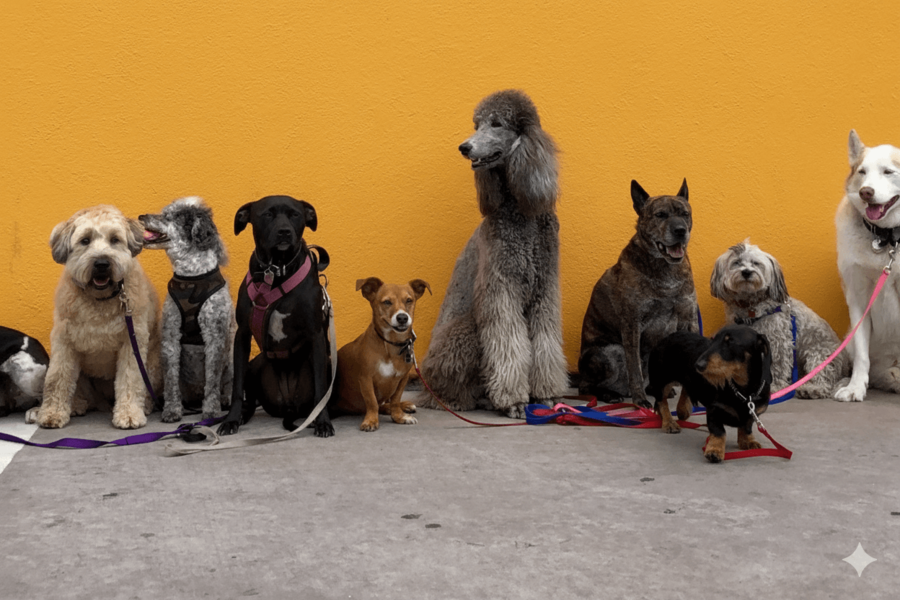
The Mastiff, also known as the English Mastiff, is a large and powerful dog breed with a history that dates back thousands of years. Known for its imposing size and gentle temperament, the Mastiff is both a formidable protector and a loving family companion. Here’s a detailed look at this ancient and noble breed.
History and Origin
The Mastiff's lineage can be traced back over 2,000 years, with its ancestors believed to have been brought to Britain by the Phoenicians around 500 B.C. The breed was originally used as a war dog, guard dog, and hunting companion, prized for its strength and courage. Mastiffs were known to have fought alongside soldiers in battles and were used to hunt large game like wild boar and even lions.
By the Middle Ages, the Mastiff was a favoured breed among English nobility, who used them to guard estates and castles. Today, the Mastiff is cherished as a gentle giant, known for its calm and affectionate nature.
Physical Characteristics
- Size: The Mastiff is one of the largest dog breeds in the world. Males typically stand between 70-91 cm at the shoulder, while females are slightly smaller at 66-86 cm.
- Weight: Adult males usually weigh between 72-104 kg, and females weigh between 54-77 kg.
- Body: Mastiffs have a massive, muscular build with a broad chest, deep ribcage, and strong, straight legs. Their large, square-shaped head is one of their most distinctive features.
- Coat: The coat of a Mastiff is short, dense, and close-lying. Common coat colours include fawn, apricot, and brindle, all of which typically feature a black mask on the face.
- Face: The Mastiff’s face is characterised by its large head, broad skull, and a short, square muzzle. They often have a wrinkled forehead, giving them a thoughtful expression.
- Tail: Their tail is set high and tapers to a point, reaching down to the hocks.
Temperament
Mastiffs are known for their calm, dignified, and gentle temperament. Despite their size and formidable appearance, they are often described as “gentle giants.” They are very loyal and protective of their families, making them excellent guard dogs. However, they are not naturally aggressive and will only act defensively when they perceive a threat.
Mastiffs are typically good with children and other pets, although their sheer size means they should always be supervised around young children to prevent accidental knocks or injuries. They are generally quiet dogs, not prone to excessive barking, and prefer to stay close to their families.
Health and Lifespan
The average lifespan of a Mastiff is 6-10 years. Like many large breeds, Mastiffs are prone to certain health issues:
- Hip and Elbow Dysplasia: These are common joint problems in large breeds, leading to discomfort and mobility issues.
- Bloat (Gastric Torsion): This is a serious condition where the stomach twists, trapping gas inside. It requires immediate veterinary attention.
- Heart Problems: Mastiffs can be susceptible to certain heart conditions, such as dilated cardiomyopathy.
- Obesity: Due to their large size, it’s important to monitor their diet to prevent obesity, which can exacerbate other health issues.
Regular vet check-ups, a balanced diet, and appropriate exercise are essential for maintaining a Mastiff’s health.
Care and Grooming
- Exercise: Mastiffs require moderate exercise to keep them healthy and fit. A couple of daily walks, each lasting around 30 minutes, are usually sufficient. Due to their size, they are prone to overheating, so exercise should be adjusted according to the weather, with care taken to avoid excessive activity during hot days.
- Grooming: The Mastiff’s short coat is relatively easy to maintain, requiring weekly brushing to remove loose hairs. During shedding seasons, more frequent brushing may be needed. Regular cleaning of their facial wrinkles is also important to prevent infections.
- Feeding: Mastiffs require a diet formulated for large breeds, with an appropriate balance of protein and fat to support their size and muscle mass. Feeding should be split into two or more meals a day to reduce the risk of bloat.
- Training: Early socialisation and training are crucial for Mastiffs. They are intelligent dogs but can be stubborn, so consistent, positive reinforcement is important. Due to their protective instincts, they need to be well-socialised to ensure they are confident and well-behaved in different environments.
Living Conditions
Mastiffs are best suited to homes with plenty of space, ideally with a large garden where they can move around comfortably. They are not well-suited to flat living due to their size. While they enjoy outdoor time, Mastiffs prefer to be inside with their family and are happiest when included in daily family activities.
Conclusion
The Mastiff is a breed that combines ancient heritage with a gentle, loyal nature. Their imposing size and protective instincts make them excellent guard dogs, while their calm and affectionate disposition makes them wonderful family pets. Though they require specific care, particularly regarding their health and exercise needs, Mastiffs are truly rewarding companions for those prepared to meet their needs. With their deep history and noble presence, the Mastiff remains one of the most esteemed dog breeds in the UK and around the world.
You can take a look at all of our Mastiffs for sale or feel free to contact us if you have any questions.
